VSGWL Resource Bank provides access to templates, guides, weblinks and contact details to support your organisation. Click on the links to access each resource and information. If there are resources you would like us to add please contact us.
Crisis Support

Emergency support for the third sector
Are you a community group, social enterprise or third sector organisation facing very severe challenges and not sure where to turn?
Any third sector organisation which may foresee significant difficulties in the next 12 months should complete an emergency support request urgently to see what support can be provided.
Community Enterprise, Scottish Community Alliance, Development Trust Association Scotland and CEIS have designed this simple route to the right support quickly. Many other support providers will be offering assistance who can work together to help you.
Click on the links and fill in a form, someone from Community Enterprise will be in touch with you to talk about the challenges and potential crisis support you may need.
Recruiting Volunteers
Volunteer Policy
- 5.1 Developing a Volunteer Policy - Guide
- 5.1.1 Volunteer Policy - Template
- 5.1.1 Volunteer Policy - Template 2
- 5.1.2 Volunteer Policy - Checklist
Volunteer Essential Policies
- 5.2.1 Equality and Diversity - Guide
- 5.2.1 Equality and Diversity Monitoring Form - Template
- 5.2.2 Volunteer Health and Safety - Guide
- 5.2.2 Volunteer Risk Assessment Template
- 5.2.2 Volunteer Risk Assessment Template 2
- 5.2.3 Insurance for Volunteers Guide
- 5.2.4 Volunteer Expenses - Guide
- 5.2.4 Volunteer Expenses Form - Template
Volunteer Best Practice guides
- 5.3.1 Confidentiality Agreement Samples
- 5.3.3 Recruiting Ex Offenders - Guide
- 5.3.3 Recruitment of Ex Offenders Policy - Template
- 5.3.4 Volunteer Scotland PVG Enrolment - Guide
- 5.3.5 NSPCC Safeguarding Policy - Template
- 5.3.5 Safe and Sound Child Protection Policy
- 5.3.6 Volunteer Safety and Lone Working Policy - Template
- 5.3.7 Volunteer Disciplinary Policy - Template
Volunteer Recruitment
- 5.4.1 Creating an Inclusive Volunteer Environment - Guide
- 5.4.1 Promoting Positive Volunteer and Staff Relations - Guide
- 5.4.2 Measuring impact of volunteering - Guide
- 5.4.2 Measuring Volunteering - Toolkit
- 5.4.2 Richard House Volunteer Impact Survey
- 5.4.3 Creating Volunteer Role Descriptions - Guide
- 5.4.3 Volunteer Role Description - Template
- 5.4.3 Volunteer Role Descriptions - Guide
- 5.4.4 Recruitment Plan -Template
- 5.4.5 Supporting Your Volunteers - Guide
- 5.4.6 Volunteering and DWP Welfare Benefits - Guide
- 5.4.6 Volunteering and the Law - Guide
- 5.5.1 Registration of Interest - Template
- 5.5.1 Volunteer Application Form - Template
- 5.5.2 Matching the Right Volunteers to the Right Role
- 5.5.2 Volunteer Interview Process - Guide
- 5.5.3 Volunteer Reference Request Letter - Template
Volunteer Support
- 5.6.1 Creating a Volunteer Agreement - Guide
- 5.6.1 Volunteer Agreement - Template
- 5.6.2 Volunteer Handbook - Template
- 5.6.3 Creating a Positive Volunteer Induction - Guide
- 5.6.3 Volunteer Induction Checklist - Template
- 5.6.3 Volunteer Record -Template
- 5.6.5 Volunteer Review Meeting Form - Template
- 5.6.5 Volunteer Support Record - Template
- 5.6.6 Managing Challenging Volunteer Situations - Guide
- 5.6.7 Volunteer Exit Questionnaire - Template
- 5.6.8 PVG scheme and young people - Guide
- 5.7 Recognising and Valuing Your Volunteers - Guide
Funding Resources
Funding News
Stay updated with the latest news and developments on funding opportunities within the third sector.
Funding Scotland
SCVO’s Funding Scotland is an advanced online funding search for your charity, community group or social enterprise. From small grants to funding for big capital projects, it can help you track down the funding you need.
Easyfundraising transforms your supporters' everyday online shopping into funds for your organisation. By shopping through the easyfundraising website or app, leading retailers donate to your charity at no extra cost to the shopper.
Community Benefit Gateway
Community Benefit Gateway (CBG) is a free online service that connects NHSScotland suppliers with third sector community organisations in Scotland. Register for free to receive practical support and assistance for your organisation.
Fundraising

Fundraising for Charities in Scotland
Welcome to our guide on fundraising for charities in Scotland! Whether you're a small local organisation or a larger charity, there are many ways to raise funds and engage your community. Below, we’ll explore different types of fundraising and provide practical examples to inspire your efforts.
Types of Fundraising
- Community Events

Organising events can be a fantastic way to bring people together and raise funds.
Example: Charity Fun Run- Host a fun run in your local park. Participants can pay an entry fee, and you can encourage them to seek sponsorships from friends and family. Offer prizes for top fundraisers to motivate participation.
- Online Crowdfunding

Leverage online platforms to reach a wider audience.
Example: GoFundMe Campaign- Create a campaign detailing your charity’s mission and needs. Share your story, use compelling visuals, and encourage donations through social media. Highlight how funds will make a difference in the community.
- Charity Auctions

Auctions can generate excitement while raising significant funds.
Example: Silent Auction- Partner with local businesses to donate items or services. Set up a silent auction during an event, allowing attendees to bid on items throughout the night. This encourages friendly competition and increases donations.
- Sponsorship Opportunities

Engage local businesses for mutual benefit.
Example: Corporate Sponsorship- Approach local businesses to sponsor an event or initiative. In exchange, offer them advertising opportunities at your event or on promotional materials. This can enhance their visibility while supporting your cause.
 Merchandise Sales
Merchandise Sales
Selling branded merchandise can be a fun way to raise funds and promote your charity.
Example: Charity Merchandise- Design t-shirts, mugs, or tote bags featuring your charity's logo or mission. Sell these items at events, on your website, or in local shops. Profits can directly support your programmes.
- Regular Giving Programmes

Encourage donors to set up monthly contributions.
Example: Direct Debit Donations- Promote a monthly giving programme where supporters can sign up to donate a fixed amount each month. Share stories about how consistent contributions make a significant impact over time.
- Workplace Giving

Involve local companies in your fundraising efforts.
Example: Payroll Giving- Collaborate with local businesses to establish payroll giving programmes, allowing employees to donate a portion of their salary directly to your charity. This can be an easy way for employees to contribute to a cause they care about.
- Challenges and Adventures

Encourage supporters to take on personal challenges.
Example: Sponsored Challenges- Organise or promote challenge events like trekking the West Highland Way or climbing Ben Nevis. Participants can raise sponsorships for their efforts, encouraging them to push their limits for a good cause.
- Larger challenges, like desert walks across the Sahara or cycling challenges to Paris, appeal to adventurous supporters. There are companies that can help organise these events.
- Grant Applications

Explore funding from larger organisations.
Example: Applying for Grants- Research and apply for grants from foundations or government bodies. Prepare detailed proposals that clearly outline how the funds will benefit the community.
- Find out more here
- Social Media Campaigns

Utilise social media to engage supporters.
Example: Hashtag Campaign- Create a social media challenge using a unique hashtag. Encourage supporters to post photos or stories related to your cause and donate. This can go viral and attract new donors.
Summary
Fundraising can take many forms, from community events to online campaigns. The key is to engage your supporters creatively and authentically. Remember to share the impact of their contributions and express gratitude for their support. With the right strategy and community involvement, your charity can achieve its fundraising goals and make a real difference!
Regulation
Fundraising is a key contact between charities and the public. Get it right, and your charity secures funding and public goodwill. Get it wrong, and you risk undermining public confidence in your charity and the wider sector.
It’s up to your charity’s trustees to ensure that they – and any fundraisers working on their behalf – observe the legal requirements and, importantly, uphold the kind of fundraising practices that will encourage continued public support, rather than harming your charity’s reputation.
More information can be found here.
More Information
HR Support
Acas (Advisory, Conciliation and Arbitration Service) gives employees and employers free, impartial advice on workplace rights, rules and best practice. They also offer training and help to resolve disputes.
You can access advice and guidance including template letters and policies by using the links below:
Find advice on employment law, HR processes and good practice at work - https://www.acas.org.uk/advice
For template letters forms and HR documents - https://www.acas.org.uk/templates
They also offer free webinars on various topics you can view and register for these here - https://www.acas.org.uk/webinars
Also they have a range of free online learning modules. You can register for these here - https://www.acas.org.uk/online-training
The GCVS ( Glasgow Council for Voluntary Sector) HR Service has been supporting third sector organisations for over 20 years with expert advice, ensuring compliance with employment law whilst supporting best practice. This service is offered on a rolling subscription with a minimum contract term of one year.
https://gcvs.org.uk/product/hr-service/
The SCVO (Scottish Council for Voluntary Organisations) HR Service provides expert help with your HR issues, in a quick and friendly way. There are free templates for everyone but bespoke HR advice has an additional cost.
Policies for Charities
Policies for Organisations Overview
By implementing comprehensive policies, a charity in Scotland can operate more effectively, safeguard its mission, and serve its community better.
This document provides a set of suggested policies intended as a general guide to support organisations in developing or updating their own policies. However, it is important to note that these recommendations may not address every unique situation, regulatory requirement, or specific operational need an organisation may encounter. Each organisation operates within a distinct legal, regulatory, and cultural framework that may necessitate tailored policies, processes, or procedures to fully address its particular context and risks.
Before implementing any suggested policies, organisations should conduct a thorough assessment to ensure alignment with their unique goals, values, and legal obligations. It is advisable to seek professional legal, regulatory, or compliance counsel to determine the applicability of these recommendations to their specific situation.
Why do Charities Need Policies?
A charity in Scotland must establish and adhere to certain policies to ensure it operates legally, ethically, and effectively. These policies help the charity maintain compliance with regulations set by the Office of the Scottish Charity Regulator (OSCR) and other relevant laws.
Without proper policies, a charity in Scotland risks legal and financial penalties, loss of charitable status, damage to its reputation, and operational inefficiencies. Policies are essential for ensuring compliance with laws, protecting trustees and beneficiaries, maintaining public trust, and achieving the charity’s objectives. Implementing these policies is not only about avoiding risks but also about fostering a healthy, effective, and sustainable organisation.
Charities in Scotland need policies for several key reasons:
- Compliance with Laws and Regulations: Charities must adhere to the Charities and Trustee Investment (Scotland) Act 2005 and other relevant legislation. Policies help ensure compliance with these laws.
- Governance and Accountability: Clear policies establish governance structures and accountability frameworks, ensuring trustees and staff understand their roles and responsibilities.
- Risk Management: Policies help identify and mitigate risks associated with the charity’s activities, including financial, operational, and reputational risks.
- Operational Consistency: Having established policies ensures consistency in decision-making and operations, improving efficiency and effectiveness.
- Safeguarding and Wellbeing: Policies related to safeguarding, health and safety, and welfare are crucial for protecting vulnerable individuals and ensuring a safe environment.
- Transparency and Trust: Well-defined policies enhance transparency, building trust with stakeholders such as donors, beneficiaries, and the public.
- Strategic Direction: Policies guide the charity’s strategic direction, ensuring alignment with its mission and objectives.
- Resource Management: Effective financial and resource management policies help ensure sustainability and accountability in the use of funds.
Key Policies for Charities to Consider
This is not a definitive or exhaustive list. Organisations should consider their needs, setup, and aims when deciding on policies to adopt. Adopting policies without proper customisation and consideration of organisational needs may lead to unintended outcomes or non-compliance with relevant regulations.
- Governance and Compliance Policies
- Governing Document: Defines the charity’s purpose, governance, and trustee powers.
- Code of Conduct for Trustees: Outlines trustee responsibilities and ethical standards.
- Conflicts of Interest Policy: Ensures impartial decision-making by declaring potential conflicts.
- Risk Management Policy: Identifies risks and provides mitigation steps.
- Compliance with OSCR Requirements: Ensures the charity meets OSCR’s filing and transparency standards.
- Financial Policies
- Financial Controls Policy: Details processes for managing funds and financial reporting.
- Fundraising Policy: Ensures compliance with fundraising laws.
- Reserves Policy: Specifies how much money the charity will hold in reserve.
- Gift Acceptance Policy: Guidelines on the types of gifts the charity will accept.
- Investment Policy: Outlines acceptable investment practices and risk levels.
- Expenses Policy: Defines recoverable expenses and the claiming process.
- Operational Policies
- Health and Safety Policy: Ensures compliance with health and safety regulations.
- Data Protection and Privacy Policy: Compliance with GDPR to protect personal data.
- IT and Cybersecurity Policy: Safeguards digital assets and ensures safe online practices.
- Volunteer Policy: Provides guidance on recruiting, managing, and supporting volunteers.
- HR and People Policies
- Equal Opportunities and Diversity Policy: Promotes equality and inclusion.
- Safeguarding Policy: Protects vulnerable individuals from harm or abuse.
- Whistleblowing Policy: Encourages reporting of unethical practices.
- Grievance and Disciplinary Policy: Ensures a fair process for disputes and breaches of conduct.
- Carers Policy: Outlines support for employees balancing work and caregiving.
- Environmental and Social Responsibility Policies
- Environmental Policy: Commits to reducing environmental impact and promoting sustainability.
- Ethical Sourcing Policy: Ensures ethical sourcing of goods and services.
- Communication and Confidentiality Policies
- Communications Policy: Guides communication with stakeholders.
- Media and Social Media Policy: Manages media inquiries and social media presence.
- Confidentiality Policy: Protects sensitive information in compliance with data protection laws.
- Monitoring and Evaluation Policies
- Impact Measurement Policy: Ensures evaluation of activities against charitable objectives.
- Complaints Handling Policy: Provides a clear process for addressing complaints from stakeholders.
Legal Requirements and Best Practices
- Charitable Purposes and Public Benefit: Activities must align with the charity’s purposes and provide public benefit as defined by Scottish law.
- Transparency and Reporting: Annual reports and accounts must be publicly available and comply with OSCR standards.
Templates, Model Policies & Checklists
For further guidance, organisations can access a range of useful templates, model policies, and checklists from SCVO’s archive: SCVO Templates.
Safeguarding
Adults at risk of harm have the right to be supported and protected. It is everyone’s responsibility to ensure they receive the help they need.
If an adult discloses harm or mistreatment:
- Listen and Reassure: Take them seriously, listen carefully, and reassure them that they are safe and that you will seek support for them.
- Do Not Promise Secrecy: Information must be shared with Social Work or the Police promptly. Only share details with those who need to know.
What to Do and Who to Contact
If you suspect an adult is at risk of harm:
- Speak to someone about it as soon as possible.
Immediate Danger:
- Call the police on 999.
Non-Emergency:
- Contact Police Scotland on 101.
Less Urgent:
- Adult Social Care Enquiry Team:
- Tel: 01506 284848
- Email: adultsocialcare@westlothian.gov.uk
- Hours: Monday to Thursday: 8.30am – 5pm, Friday: 8.30am – 4pm
Outside Office Hours:
- Social Care Emergency Team:
- Tel: 01506 281028/9
Local Social Work Centres (Ages 16-65):
- Broxburn: Tel: 01506 284440
- Livingston: Tel: 01506 282252
Police:
- Tel: 101 (Non-Emergency)
- Emergency: 999
For more information, visit Public Protection West Lothian.
Net Zero

As West Lothian's Third Sector Interface, we are committed to empowering the local third sector—charities, social enterprises, and community groups—to thrive and create a lasting positive impact. Collaboration and innovation are at the heart of tackling today’s environmental challenges, from promoting sustainable practices to advancing the journey toward net zero.
The West Lothian Climate Action Network (WLCAN) is on a mission to build a sustainable future for our region by reducing greenhouse gas emissions, encouraging renewable energy, and educating the public about climate change. Explore more about WLCAN’s initiatives and their support for net zero efforts on their website.
🔗 WLCAN Website
🔗 WLCAN Resources
Net Zero Planning Templates
To help with your net zero planning and implementation, use these practical templates:
- Net Zero Action Plan Template
- Carbon Footprint Calculator Template
- Sustainability Reporting Framework
- Net Zero Strategy Guide
Additional Net Zero Resources
Discover these valuable resources to support your net zero journey:
Training
Adult Support & Protection Training
Two training levels are available: Level 1 provides an overview for new front-line staff across statutory, independent, and voluntary sectors, focusing on identifying and responding to adults at risk of harm. Level 2 offers more advanced guidance, supporting participants in recognising at-risk adults and navigating the processes involved in Adult Support and Protection.
Children in Scotland eLearning Hub
Children in Scotland offers free eLearning courses through its eLearning hub, providing a range of training to help improve skills and knowledge across the sector. Explore their available courses here.
GDPR Training
The Gateway have partnered with Computer Law Training to offer Third Sector organisations online GDPR training.
Writing a Children’s safeguarding policy and procedures
Children have the right to be protected from harm. If your organisation or group works with children or young people you must have a clear set of guidelines about how you will keep children safe and respond to child protection concerns.
A safeguarding or child protection policy statement makes it clear what your organisation or group will do to keep children safe.
NSPCC Learning have online resource, including a Safeguarding template , and you can find that here.
VSGWL Event Recordings
Please find below a list of video recordings from recent VSGWL events:
- Learn about West Lothian 4 Community Funding Search - Webinar
- West Lothian Communities Mental Health & Wellbeing Fund - Year 4 Q&A Session
- Income Maximisation for Social Enterprises - August 2024
- Community Benefit Gateway Drop-In Lunch Session – June 2024
- Charity Law Information Session – May 2024
- Carer Positive Event – April 2024
- West Lothian Suicide Prevention Strategy Event – April 2024
- Funding Application Workshop (Idox Funding Tool only) - February 2024
- Funding Application Workshop – February 2024
- Meet the Funder – The Robertson Trust – October 2023
- Meet the Funder – The Corra Foundation – August 2023
- Meet the Funder – The National Lottery Community Fund – January 2023


